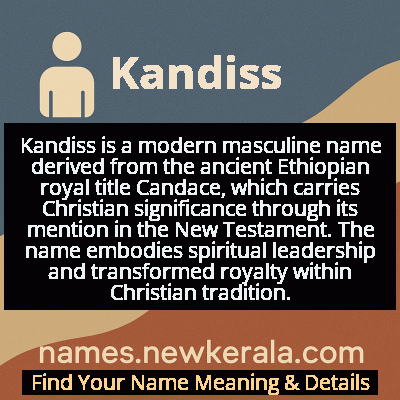Kandiss Name Meaning & Details
Origin, Popularity, Numerology Analysis & Name Meaning of Kandiss
Discover the origin, meaning, and cultural significance of the name KANDISS. Delve into its historical roots and explore the lasting impact it has had on communities and traditions.
Name
Kandiss
Gender
Male
Origin
Christian
Lucky Number
5
Meaning of the Name - Kandiss
Kandiss is a modern masculine name derived from the ancient Ethiopian royal title Candace, which carries Christian significance through its mention in the New Testament. The name embodies spiritual leadership and transformed royalty within Christian tradition.
Kandiss - Complete Numerology Analysis
Your Numerology Number
Based on Pythagorean Numerology System
Ruling Planet
Mercury
Positive Nature
Adventurous, dynamic, curious, and social.
Negative Traits
Restless, impatient, inconsistent, prone to indulgence.
Lucky Colours
Green, white.
Lucky Days
Wednesday.
Lucky Stones
Emerald.
Harmony Numbers
1, 3, 9.
Best Suited Professions
Sales, marketing, travel, entertainment.
What People Like About You
Versatility, charisma, adventurous spirit.
Famous People Named Kandiss
Kandiss Taylor
Politician
American political candidate known for conservative Christian advocacy
Kandiss Hernandez
Pastor
Christian minister and community leader focusing on youth outreach
Kandiss Williams
Educator
Christian school administrator and curriculum developer
Name Variations & International Equivalents
Click on blue names to explore their detailed meanings. Gray names with will be available soon.
Cultural & Historical Significance
In its modern masculine form as Kandiss, the name demonstrates how naming conventions can cross gender boundaries while maintaining their cultural and spiritual significance. The transformation from an ancient royal title for women to a contemporary masculine given name reflects broader trends in name adaptation and the Christian practice of reclaiming historical names with biblical connections. This evolution also speaks to the growing acceptance of names that bridge different cultural traditions while maintaining their spiritual resonance within Christian communities.
Extended Personality Analysis
Individuals named Kandiss are often perceived as possessing natural leadership qualities and a strong sense of responsibility, reflecting the name's royal origins. They tend to be charismatic, confident, and principled, with a deep sense of moral conviction that guides their decisions and actions. Many Kandiss bearers demonstrate a blend of traditional values and modern adaptability, allowing them to navigate complex social situations with grace and authority.
In interpersonal relationships, those named Kandiss typically exhibit protective and nurturing tendencies, often taking on mentorship roles within their communities. They are frequently described as having strong communication skills and the ability to inspire others, coupled with a practical wisdom that makes them sought-after advisors. Their combination of strength and compassion, along with a natural dignity, often positions them as respected figures in both professional and personal contexts, embodying the regal qualities suggested by their name's etymology.
Modern Usage & Popularity
Kandiss has emerged as a distinctive masculine name primarily within English-speaking Christian communities, particularly in the United States. While not ranking among the most popular names, it has gained steady usage since the late 20th century as parents seek unique yet meaningful names with biblical connections. The name appeals to Christian families who appreciate its royal Ethiopian heritage and New Testament reference while desiring a modern, gender-distinct variation. Its usage reflects contemporary naming trends that value historical depth combined with distinctive spelling and masculine presentation, often chosen by parents looking for names that stand out while maintaining spiritual significance.
Symbolic & Spiritual Meanings
Kandiss symbolizes transformed royalty and spiritual leadership, representing the idea that true nobility comes from moral character and faith rather than hereditary status. The name carries connotations of authority tempered with wisdom, suggesting someone who leads through example and integrity rather than power alone. Metaphorically, it represents the Christian concept of being 'royal priesthood' (1 Peter 2:9), where every believer carries spiritual authority and responsibility. The name's journey from ancient African queenship to modern masculine usage also symbolizes the transformative power of faith and the breaking of traditional boundaries, embodying the idea that spiritual inheritance transcends gender, culture, and historical context.

